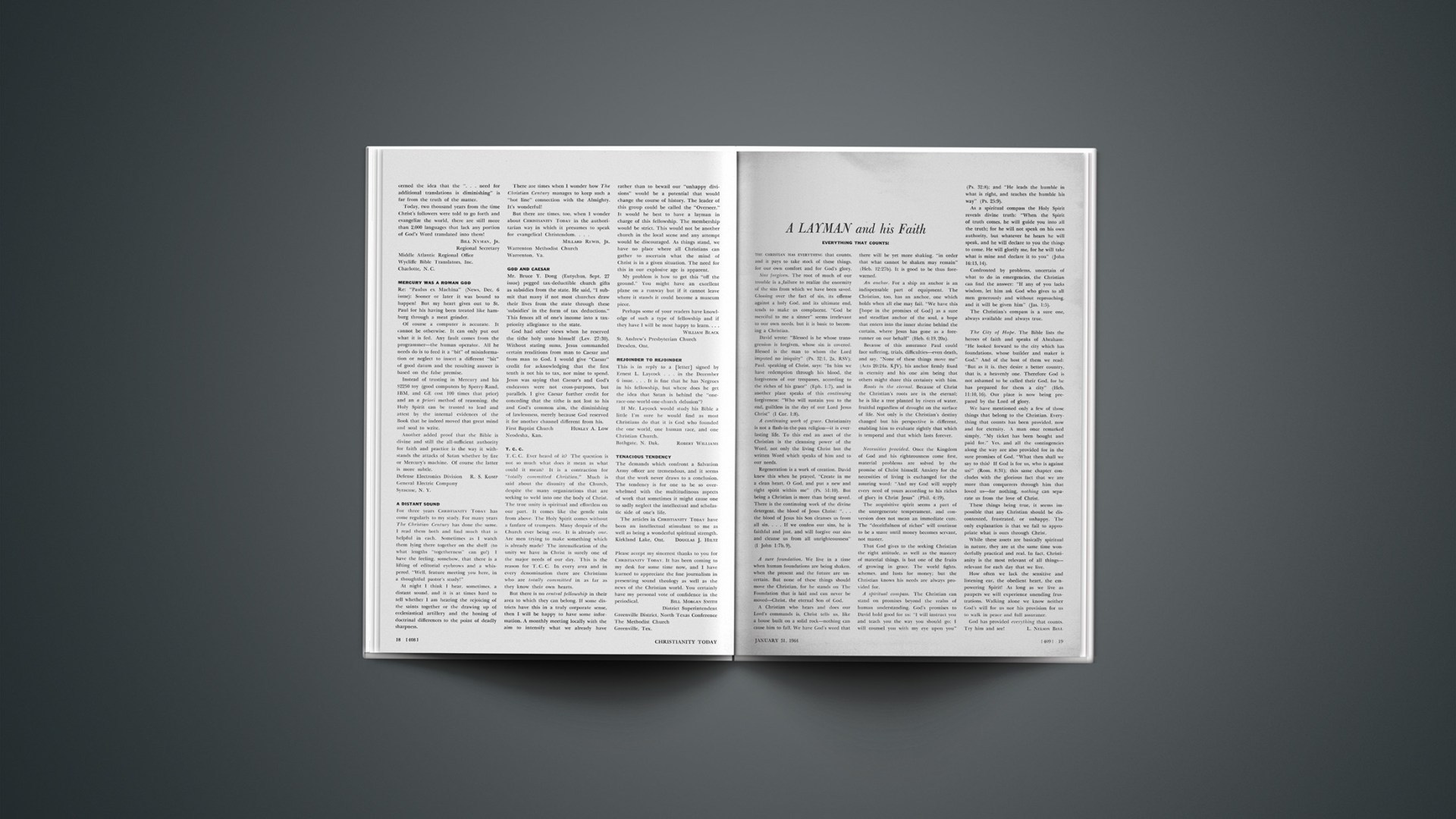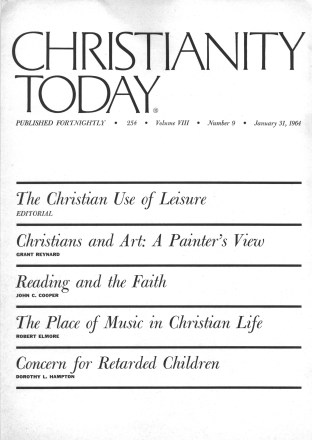The christian has everything that counts, and it pays to take stock of these things, for our own comfort and for God’s glory.
Sins forgiven. The root of much of our trouble is a failure to realize the enormity of the sins from which we have been saved. Glossing over the fact of sin, its offense against a holy God, and its ultimate end, tends to make us complacent. “God he merciful to me a sinner” seems irrelevant to our own needs, but it is basic to becoming a Christian.
David wrote: “Blessed is he whose transgression is forgiven, whose sin is covered. Blessed is the man to whom the Lord imputed no iniquity” (Ps. 32:1, 2a, RSV); Paul, speaking of Christ, says: “In him we have redemption through his blood, the forgiveness of our trespasses, according to the riches of his grace” (Eph. 1:7), and in another place speaks of this continuing forgiveness: “Who will sustain you to the end, guiltless in the day of our Lord Jesus Christ” (1 Cor. 1:8).
A continuing work of grace. Christianity is not a flash-in-the-pan religion—it is everlasting life. To this end an asset of the Christian is the cleansing power of the Word, not only the living Christ but the written Word which speaks of him and to our needs.
Regeneration is a work of creation. David knew this when he prayed, “Create in me a clean heart, O God, and put a new and right spirit within me” (Ps. 51:10). But being a Christian is more than being saved. There is the continuing work of the divine detergent, the blood of Jesus Christ: “… the blood of Jesus his Son cleanses us from all sin.… If we confess our sins, he is faithful and just, and will forgive our sins and cleanse us from all unrighteousness” (1 John 1:7b, 9).
A sure foundation. We live in a time when human foundations are being shaken, when the present and the future are uncertain. But none of these things should move the Christian, for he stands on The Foundation that is laid and can never be moved—Christ, the eternal Son of God.
A Christian who hears and does our Lord’s commands is, Christ tells us, like a house built on a solid rock—nothing can cause him to fall. We have God’s word that there will be yet more shaking, “in order that what cannot be shaken may remain” (Heb. 12:27b). It is good to be thus forewarned.
An anchor. For a ship an anchor is an indispensable part of equipment. The Christian, too, has an anchor, one which holds when all else may fail. “We have this [hope in the promises of God] as a sure and steadfast anchor of the soul, a hope that enters into the inner shrine behind the curtain, where Jesus has gone as a forerunner on our behalf” (Heb. 6:19, 20a).
Because of this assurance Paul could face suffering, trials, difficulties—even death, and say, “None of these things move me” (Acts 20:24a, KJV), his anchor firmly fixed in eternity and his one aim being that others might share this certainty with him.
Roots in the eternal. Because of Christ the Christian’s roots are in the eternal; he is like a tree planted by rivers of water, fruitful regardless of drought on the surface of life. Not only is the Christian’s destiny changed but his perspective is different, enabling him to evaluate rightly that which is temporal and that which lasts forever.
Necessities provided. Once the Kingdom of God and his righteousness come first, material problems are solved by the promise of Christ himself. Anxiety for the necessities of living is exchanged for the assuring word: “And my God will supply every need of yours according to his riches of glory in Christ Jesus” (Phil. 4:19).
The acquisitive spirit seems a part of the unregenerate temperament, and conversion does not mean an immediate cure. The “deceitfulness of riches” will continue to be a snare until money becomes servant, not master.
That God gives to the seeking Christian the right attitude, as well as the mastery of material things, is but one of the fruits of growing in grace. The world fights, schemes, and lusts for money; but the Christian knows his needs are always provided for.
A spiritual compass. The Christian can stand on promises beyond the realm of human understanding. God’s promises to David hold good for us: “I will instruct you and teach you the way you should go; I will counsel you with my eye upon you” (Ps. 32:8); and “He leads the humble in what is right, and teaches the humble his way” (Ps. 25:9).
As a spiritual compass the Holy Spirit reveals divine truth: “When the Spirit of truth comes, he will guide you into all the truth; for he will not speak on his own authority, but whatever he hears he will speak, and he will declare to you the things to come. He will glorify me, for he will take what is mine and declare it to you” (John 16:13, 14).
Confronted by problems, uncertain of what to do in emergencies, the Christian can find the answer: “If any of you lacks wisdom, let him ask God who gives to all men generously and without reproaching, and it will be given him” (Jas. 1:5).
The Christian’s compass is a sure one, always available and always true.
The City of Hope. The Bible lists the heroes of faith and speaks of Abraham: “He looked forward to the city which has foundations, whose builder and maker is God.” And of the host of them we read: “But as it is, they desire a better country, that is, a heavenly one. Therefore God is not ashamed to be called their God. for he has prepared for them a city” (Heb. 11:10, 16). Our place is now being prepared by the Lord of glory.
We have mentioned only a few of those things that belong to the Christian. Everything that counts has been provided, now and for eternity. A man once remarked simply, “My ticket has been bought and paid for.” Yes, and all the contingencies along the way are also provided for in the sure promises of God. “What then shall we say to this? If God is for us, who is against us?” (Rom. 8:31); this same chapter concludes with the glorious fact that we are more than conquerers through him that loved us—for nothing, nothing can separate us from the love of Christ.
These things being true, it seems impossible that any Christian should be discontented, frustrated, or unhappy. The only explanation is that we fail to appropriate what is ours through Christ.
While these assets are basically spiritual in nature, they are at the same time wonderfully practical and real. In fact, Christianity is the most relevant of all things—relevant for each day that we live.
How often we lack the sensitive and listening ear, the obedient heart, the empowering Spirit! As long as we live as paupers we will experience unending frustrations. Walking alone we know neither God’s will for us nor his provision for us to walk in peace and full assurance.
God has provided everything that counts. Try him and see!










